Keep up to date with progress by following @TheChristieNHS on Twitter and give us your feedback by using the hashtag #christieprotons.
- Patients and visitors
- Research
- Education
- Work with us
- About us
- The Christie Charity
Keep up to date with progress by following @TheChristieNHS on Twitter and give us your feedback by using the hashtag #christieprotons.
Earlier this month, The Christie was visited by some supercars, including the Porsche 911 GT3 and the Ferrari 458. Our younger patients being treated at the Christie were invited to see these cars – worth over £100,000!

In May, we started a new monthly entertainment programme in the proton beam therapy centre at The Christie. The entertainment programme is being provided by the charity ‘Spread a Smile’.
We had a singing fairy and magician here last week and it was a brilliant afternoon for the children and families at our centre. Everyone was really happy and enjoyed the session.

The APPROACH trial compares proton vs photon radiotherapy in the treatment of oligodendroglioma, looking at how different treatments affect cognitive health post treatment.
Radiotherapy, traditionally delivered using photon radiation, is an important component of treatment. Despite controlling the tumour, photon radiotherapy can damage the surrounding healthy brain, resulting in long-term irreversible side effects. This can subsequently affect neurocognitive function and may impact the individual’s quality of life.
Proton beam therapy (PBT) is an alternative type of radiotherapy that can potentially spare more surrounding healthy brain, without compromising tumour control. The lower healthy tissue doses from PBT offer the potential for reduced long-term toxicity, possibly lessening neurocognitive impact.
We are taking part in this trial at The Christie and successfully finished treating our first patient on the APPROACH trial at the end of April 2024. A camera crew came into the department to film the patient’s final treatment and captured a lovely moment of the patient ringing the end of treatment bell. Keep an eye out for this on ITV News Granada.

One of our health play specialists, Penelope, has been leading a virtual reality distraction therapy project within the paediatric service. This project was approved in November 2023 by the proton research committee as a service development project. Penelope’s application for funding for the VR device from the PBT research funding round in March 2024 was successful and this will fund the lease of the kit for 2 years.
Evidence suggests that the use of virtual reality distraction therapy during clinical procedures alleviates stress and anxiety in children and young people which may help improve their experience of the treatment. We are keen to identify if virtual reality can benefit our patients during their treatment and reduce levels of anxiety.
The play specialist team have received training for this device, which will support some children during clinical procedures and proton/radiotherapy treatments. The team started using the kit in April 2024. To date, it has been beneficial to help distract children during cannulation and blood tests. We have also seen a benefit in the proton treatment room to help alleviate frustration and anxiety during treatment.
The project will run until summer 2026 and Penelope will be hosting sessions for staff to try the VR kit. The findings from the project will be shared in the coming months.

Earlier this year, some patients who had previously received proton beam therapy enjoyed an overnight stay in London. The Teenage Cancer Trust provided a visit to the Royal Albert Hall for a concert provided by the Teenage Cancer Trust. A day of sightseeing then followed, including a ride on the London Eye.

The first ever Christie proton beam therapy open day took place on Saturday 25 November 2023. Tours of the department took place every 15 minutes and included pre-treatment, treatment planning, treatment gantries and paediatric areas including anaesthetic induction/recovery rooms.
The open day was advertised both locally and across our social media channels, with members of the HR team at The Christie offering their support on the day. Many people attended the open day including prospective students, patients and families, prospective staff members and local visitors.
Lots of positive feedback was received from the departmental tours and a big thank you to all our staff members who gave up their Saturday morning to facilitate the first ever Christie proton beam therapy open day!
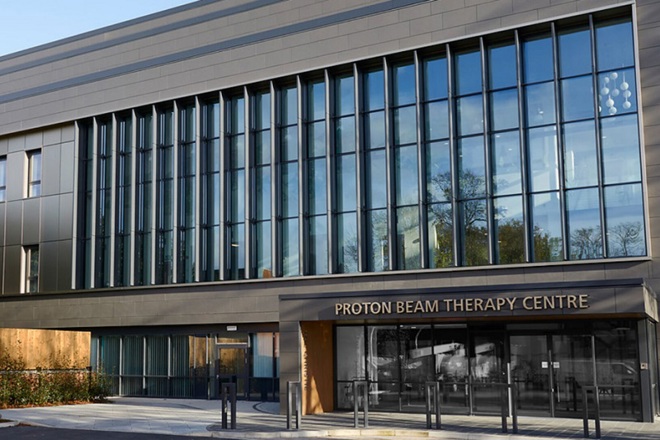
World Radiography Day is celebrated on 8 November each year. This year, in the proton beam therapy centre at the Christie, we celebrated the day with a display outlining the crucial role of our radiographers as well as providing radiography colouring sheets to our paediatric patients!
Within the proton beam therapy centre at The Christie, we have both diagnostic and therapeutic radiographers who work as part of a multi-disciplinary team to create patient immobilisation devices, perform planning scans and deliver treatment to our patients. Our radiographers play a vital role in the patient pathway, building excellent rapport and offering support to patients throughout their treatment.
We’d like to thank all of our wonderful radiographers within the proton beam therapy centre for their hard work and dedication to the profession!
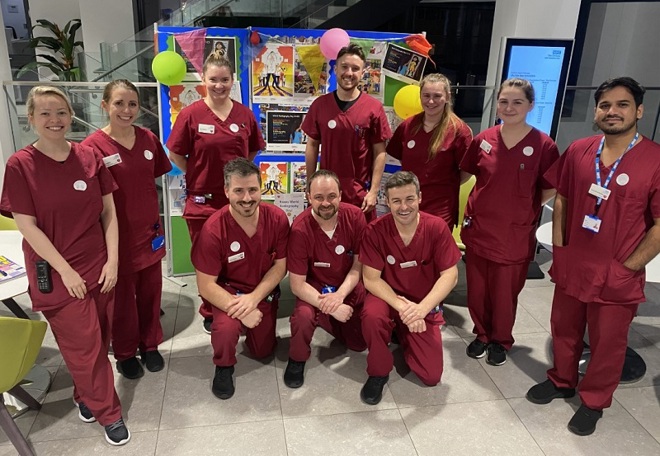
We have recently developed a display board within the paediatric day unit to increase staff visibility within the department in response to patient and guardian feedback.
The day unit team put together a collection of photographs which show the different groups of staff members working amongst the PBT team. The board includes photographs of paediatric nurses, domestic staff, the TYA co-ordinator, anaesthetic staff, play specialists and radiographers.
The radiographic team cannot always be present in the day unit area, so the Radiographer photos on display are now updated daily to ensure everyone is aware of who is treating general anaesthetic patients each day.
A big thank you to our day unit team for putting this together for the benefit of our patients and their families!
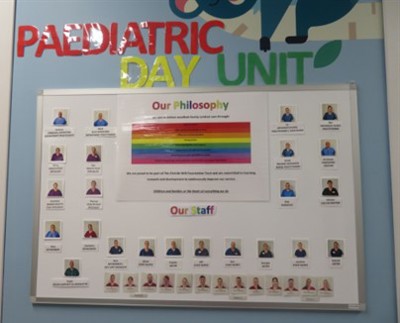
In September 2023, some of our superintendent and principal radiographers visited the PBT centre at University College London Hospital (UCLH), which opened in 2021. Now that both centres are open, UCLH provides treatment to those in the south of the country.
The aim of the visit was to establish any similarities and differences in practice used across the 2 departments. The teams discussed patient setup and immobilisation, treatment techniques, imaging protocols, clinical trials and treatment efficiency. This provided much needed insight into how the other half of the UK national proton service operates.
“It was reassuring that even though there were a few differences in practice, generally we were on the same page for the majority of aspects.”
- Hope Kolbe, superintendent pre-treatment radiographer
As a result of the visit, quarterly meetings between both centres have now been set up to maintain an open dialogue and to share ideas continually.
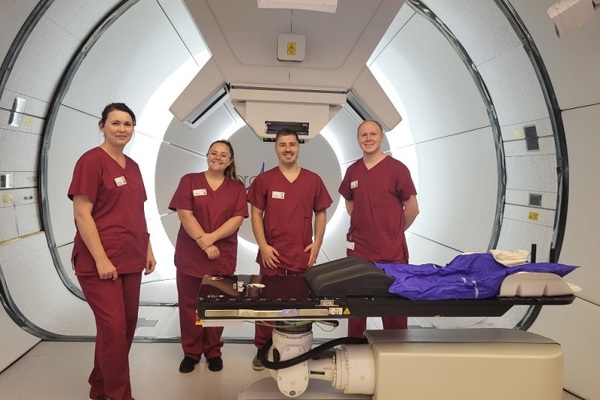
The PBT coffee morning has made its return following a break due to COVID-19 restrictions.
Before the pandemic, we held a weekly coffee morning in the PBT waiting area to give the opportunity for patients, families and staff to interact outside of the clinical environment. We are pleased to be able to re-instate these coffee mornings within the department and they will continue to be held monthly.
A selection of drinks, sandwiches, cakes and biscuits are provided for patients, family members, carers and staff to enjoy. The coffee mornings increase the sense of community in the department and allow staff to chat to patients and their families away from the treatment machines and clinical areas.
The PBT coffee mornings are currently organised by our brilliant clinical support worker team and have received excellent feedback from patients, families and staff alike.
Congratulations to staff members from the proton beam therapy centre who are The Christie staff rounders cup champions!
The tournament took place at South Manchester Cricket Club on Wednesday 9 August 2023, with the sunny weather making for a great evening of rounders.
The ‘Proton Pitchers’ team was formed by therapeutic and diagnostic radiographers working across the treatment gantries and pre-treatment areas in the proton beam therapy centre at The Christie. The team were undefeated on the evening coming top in the group stages, knocking out ‘The Twigglets’ (from the network services senior team) in the semi-finals, before beating the ‘GI Joes’ (from the gastrointestinal research team) in the final.
The staff rounders cup was a fun evening for all involved. We’d like to say a big thank you to the engagement team who organised the tournament and congratulations to the champions, the Proton Pitchers!
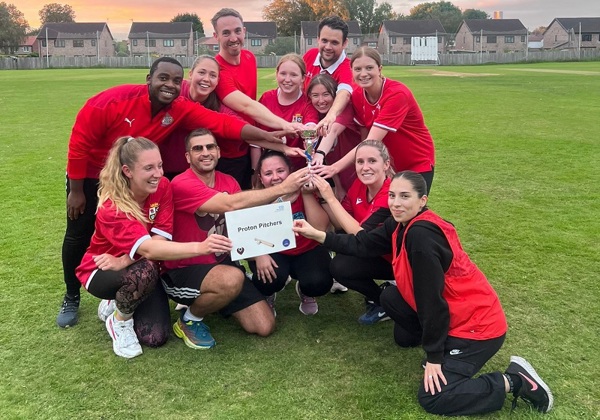
A multi-disciplinary group of proton beam therapy staff recently attended the Particle Therapy Co-Operative Group (PTCOG) conference in Madrid, Spain. PTCOG organises annual conferences with scientific meetings and educational sessions for those interested in proton, light ion and heavy charged particle radiotherapy. Clinicians, keyworkers, therapeutic radiographers and physicists presented at and attended the international event.
“I found the conference extremely interesting and enjoyable as there was a mixture of subjects which ranged from physics lectures to clinical outcomes and research developments. There was a main focus on both FLASH and adaptive PBT techniques. However, the most interesting topic to me were the immobilisation devices and treatment techniques used for breast patients internationally. As our department is relatively new to treating this patient cohort, we learnt a lot from other PBT centres experiences and outcomes.”
Preeti Gumbhir, senior therapeutic radiographer
The 62nd Annual PTCOG Conference is due to be held in Singapore next year.
Kim Jones, from Cambridgeshire, was one of the first people in England to have proton beam therapy for breast cancer as part of a pioneering clinical trial at The Christie.
Kim said: "The proton beam therapy centre at The Christie is bright and spacious and feels very relaxing. The staff are wonderful and seem to have thought of everything. Their care is second to none, and I feel completely safe in their hands."
The PARABLE trial will compare proton beam therapy with conventional radiotherapy for treating breast cancer patients who are at higher risk of long-term heart problems after radiotherapy treatment.
Dr Carmel Anandadas, consultant clinical oncologist at The Christie added: “We are excited to be able to offer the first NHS proton beam therapy treatments to breast cancer patients as part of the PARABLE trial. We hope proton beam therapy will allow doctors to deliver the required dose of radiotherapy where it’s needed, while minimising the dose of radiation delivered to the heart, and without increasing the risk of early side effects such as skin redness and changes in breast appearance."
You can read more about this story in our press release.
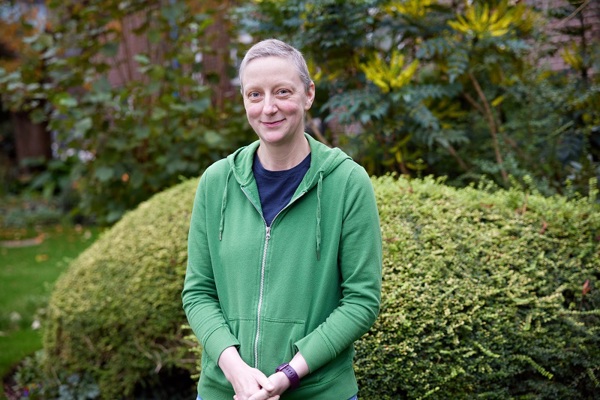
The research room in the proton therapy clinical centre is fully operational and conducting experiments. Supporters of The Christie Charity raised £5.6 million towards the cost of the dedicated research room and the state-of-the-art equipment needed to run it. We can now use the research room to improve outcomes for even more patients.
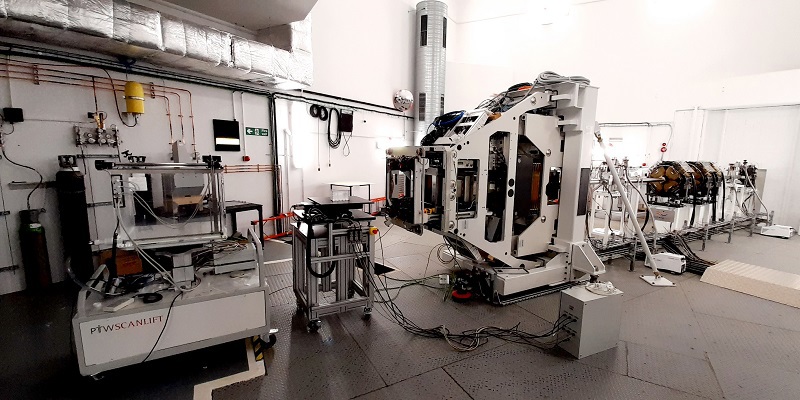
The first proton research beamline was commissioned in early 2021. With the associated bio-preparation room, it’s now routinely used for experiments, after clinical operation has finished for the day.
The first beamline in the research room is used for in vitro radiobiology and physics research. In vitro trials are ones where samples are studied in a petri dish or test tube, not in the human body.
At the end of the beamline, a scanning nozzle can mimic the delivery of the clinical beam, just like when treating patients. After the scanning nozzle, there is space for a range of different end-stations, which allow a wide variety of experiments to be conducted.
For example, the hypoxia end station with integrated robotic arm allows experiments on a range of different biological samples. This allows a reduction in biological uncertainties, increased experimental accuracy and reproducibility of results, and aids the translation of proton research into the clinic.
Due to the COVID-19 pandemic, the proton research team had to install and commission the research room themselves. This gave the group an excellent understanding of its operation.
In the past year, the proton research group have commissioned high dose-rate proton irradiation and ultra-high dose rate (FLASH) irradiation with single spots and high dose rate spot scanning. The research room gives the group the opportunity to explore FLASH. The team is also working with clinical colleagues to translate this work to the clinic if FLASH fulfils its potential of sparing normal tissue whilst still supressing tumour growth.
To ensure we can keep making breakthroughs in cancer treatments, The Christie Charity is running a campaign to raise funds for cancer research. A donation from you today can help fund the research to bring the next breakthrough into focus.
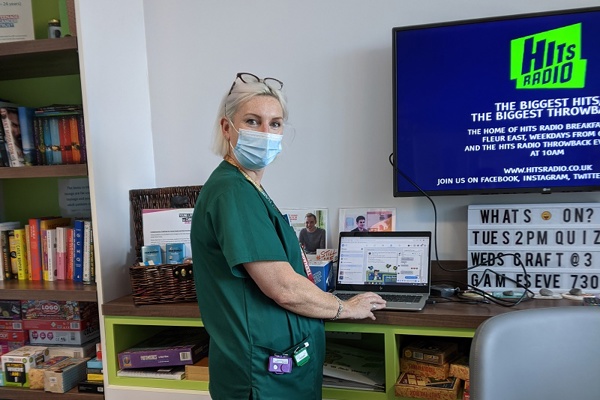
Youth support coordinator at The Christie, Angie Burns
At the proton beam therapy centre at The Christie, Youth Support Co-ordinators (YSCs) provide a range of social and emotional support to young people aged 13 to 24 undergoing treatment. This includes activities at the proton beam therapy centre such as pool, air-hockey, PlayStation, arts and crafts, and games and puzzles. There is also additional support at Stay City Apartments in Manchester, with 2 nights a week offering pizza and games nights.
YSCs support young people both during and after treatment for up to 2 years including 1:1 support, hospital-based workshops, support groups and residential opportunities.
COVID-19 brought the whole YSC service to a standstill. Young people were required to shield and were isolated even further from their normal environments and peer support. This had a serious negative impact on their wellbeing and mental health.
The YSC team, with the support of The Christie and Teenage Cancer Trust, very quickly developed a safe online programme for young people to participate in, requiring young people to ‘sign up’ to engage in the online service.
Alongside continuing individual support via text, phone calls and online sessions, the programme has included body image support groups, lads' nights in, magic events, quizzes, games nights, ‘An Evening With…’ events (featuring celebrity guests and motivational speakers), music tuition, arts and crafts workshops, careers guidance and information events regarding mental health, exercise and nutrition.
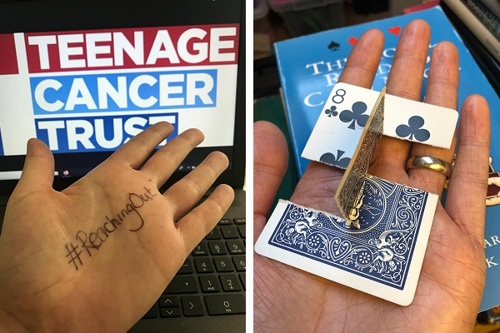
Some of the online youth support co-ordinator activities during the COVID-19 pandemic
The service developed by the YSC team at The Christie has given young people structure to their week, opportunity to meet others, gain support and — most importantly — have some fun at a very challenging time.
© 2024 The Christie NHS Foundation Trust